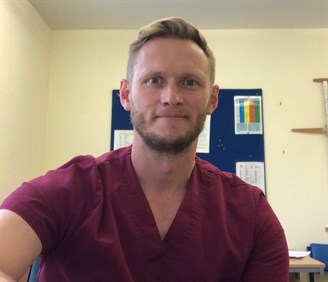Adapting to new ways of working
A GP's view: Dr John Stevenson, GP at Hereford’s Cantilupe Surgery and Clinical Director for the WBC PCN, reflects on how changes to the way consultations have been undertaken during the COVID19 pandemic have affected him, his colleagues and the surgery’s patients.

Q: How did you adapt to the new way of working. In particular, how did you get to grips with the required technology?
Using telephone, and to a lesser degree video consultation,was already a standard part of the practice. However, the biggest change for us was the need to undertake 100% remote triage. Although this model isn’t unheard of in general practice, it wasn’t embedded in our practice.
When the pandemic really started kicking off in March, the pressure was felt by a lot of our team. We had to make the technology work, although we were worried about the prospect and unsure what it would look like.
We were delivered accuRx by the CCG and it has been very useful. It’s a system that is well established and was therefore pretty much ready to go. It had no gremlins, or if there were problems they were resolved very quickly. Also, being able to text information on a wide range of topics to patients’ phones has been really helpful.
The other great benefit of accuRx is the video mode. I must admit that at the beginning I wondered how video would add to what could be achieved by phone. However, although video is still not the same as face-to-face consultation, it moves you a long way forward. The sheer ability to get a sense of how someone’s moving or behaving is hugely beneficial. For example, I remember seeing a child with a limp on video and the ability to see them hop, run around, interact with their parents was hugely helpful in enabling me to manage the situation and arrange the appropriate tests.
There was also another case where family members could send me a recording of their mother’s tremor and allowed us to defer some testing until the risk of face-to-face assessment seemed appropriate.
Q: To what extent do you think new technology will be carried forward into the post-COVID world?
It is not going to be possible for us to have a walk-in service at the surgery for the foreseeable future and we will continue to carry out 100% initial remote consultation. I suspect we will have to have more outreach to our more vulnerable patient groups and to those who aren’t technologically able.
The use of video has dropped off since we started opening up our face-to-face services again since lockdown eased. I don’t think we will adopt video consultations entirely in the future. Although it may be more convenient for both parties, it doesn’t save the practitioner any time and requires a new skill set of active listening and active watching in a way that isn’t the same in face-to-face consultation. There will be a place for video – especially for those conditions that come and go, when you might ask the patient to record some images and I think it’s useful to offer in the range of more accessible means of contacting our service.
The big concern regarding video is that it doesn’t enable me as a GP to pick up those cues that often only reveal themselves in face-to-face consultation. All GPs learn early on in their careers that patients frequently turn up for one thing and another concern will appear when you’ve established rapport and they feel comfortable enough to divulge it.
Another concern for me is the group of people who are unable or unwilling to use technology. We don’t want to put patients off consulting us, and we need to continue to get the message across that we’re here although operating in a different way.
Mental health assessment has also been difficult. Establishing rapport with someone who is first divulging their symptoms and talking about their emotional distress has been really challenging remotely. In some ways video consultation might be a useful tool in these circumstances, but I think I’ve used it less than I could have. No one wants IT gremlins when focusing on what might be challenging discussions.
Q: What other lessons have you learnt from your experiences of working throughout the pandemic?
I’ve realised how much I rely on my team. It’s made me recognise how valuable my working relationships with my colleagues are (both within and outside of the practice). We’ve all got different strengths, we’re pretty fleet-footed when we need to be and the resilience we have offered one another has carried us through.
The pandemic has given us the chance to ‘push the pause button’ and reflect on the services we offer and what’s really valuable and important. We’ve experienced new levels of stress and it’s made me realise the importance of looking after ourselves and making sure you include gaps to recover, rest and recuperate. This ensures you continue to be able to help other people.
And finally, being part of a local group of practitioners who have met throughout the pandemic and have had the courage to make decisions about what’s right for Herefordshire – sometimes when national advice isn’t available (or even where it is!). We mustn’t lose sight of that.
More Articles
For further information about any of these news stories, please email the Communications Team

Taurus Annual Report 2024/25
Taurus Healthcare has published its Annual Report for 2024/25. The report reflects a year of transformation…

Herefordshire chosen to help shape the future of local health and care
We’re excited to share that Herefordshire has been selected as one of just 43 areas in England…

Herefordshire GP Leaders Spotlighted in National NHS Confederation Webinar
Dr Lauren Parry, Medical Director, and Dr Nigel Fraser, Chairman of Herefordshire General Practice…
